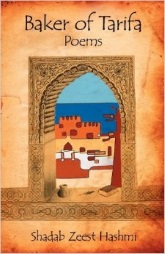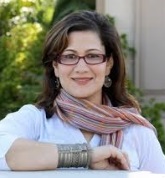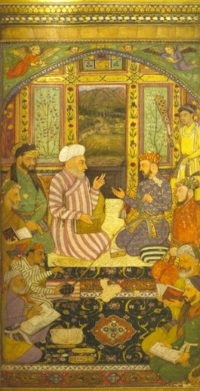Q & A with Shadab Zeest Hashmi
 Can you tell us a little about your writing/revision process?
Can you tell us a little about your writing/revision process?
I write on an empty stomach. The first draft is hand-written in a slim notebook that I keep with me. I like to take a break before revising, so I have some distance from the work and I can be super-critical. I revise on the computer and I revise multiple times, typically with tea and almonds.
Any advice for a beginning writer?
Read a rich variety of works. Don’t ignore the voices in your head—they’ll never say anything unimportant to an artist. Be kind to yourself when writing and harsh when editing. I believe that “there is no great writing, only great rewriting.”
A favorite essay/memoir/short story on the topic of identity and borders?
Manto’s short story “Toba Tek Singh” is a classic. Novels Ali and Nino by Kurban Said and People of the Book by Geraldine Brooks explore identity in poignant ways. I find Ibtisam Barakat’s Tasting the Sky: A Palestinian Childhood to be one of the most moving, beautiful memoirs dealing with identity and borders.
Your favorite social media tool?
Shadab Zeest Hashmi’s poems are
Writing to My Maker From the Cafe Between Afghanistan and Pakistan,
On My Bravest I’ll Bestow a Burka,
and Dear Partitioned Dead
Where did the idea for your piece come from?
“Dear Partitioned Dead”
A few years ago I visited Barka (Pakistan/India border) where I saw an antique phone. It was in a military booth just on the edge of No Man’s land. The poem began then.
“On my Bravest I’ll Bestow a Burka”:
Growing up in Peshawar during the Soviet invasion of Afghanistan, I recall young refugee widows in burkas who were engaged in the enormously difficult task of making a new life for themselves and their children. They became a model of fortitude for me. In this poem I declare the burka as an honor, a badge of courage for men and women who demonstrate such bravery. My rhetoric attacks the notion that the veiled woman is a no body.
Can you tell us a little about your writing/revision process?
I write on an empty stomach. The first draft is hand-written in a slim notebook that I keep with me. I like to take a break before revising, so I have some distance from the work and I can be super-critical. I revise on the computer and I revise multiple times, typically with tea and almonds.
E-reader. Hardcover. Paperback?
Except for a few heirloom books or books signed by the author, I prefer paperbacks—they’re affordable and portable.
Chocolate. Strawberry. Vanilla?
Chocolate for its fiendishness, strawberry for color and vanilla because it’s a no-brainer.
Coffee or Tea?
Tea with a friend.
Dog. Cat. Horse. Gorilla?
Horse – by far!
Fame. Wealth. Looks. Respect. Love?
Love that is amnesiac about betrayal and sorrow
Favorite cuisine?
Chapli Kabab
Favorite movie based on a book?
Hamlet
Favorite movie?
The Scent of Green Papaya
Favorite song?
“I would walk 500 miles”
Favorite place in the big wide world?
Anadolu, Turkiye
Favorite magazine?
The New Yorker
Favorite work of art?
Van Gogh’s sunflowers (mesmerizing and comforting at the same time)— also the chocolate sculptures of Turin’s famous Chocolate Festival in the cold Italian sun.
Favorite poem/poet?
Rumi’s poem “Sugar merchants, I have news: Joseph has arrived from Egypt with the essence of sweetness.” I have a long list of favorite poets.
Favorite books/authors classic and contemporary
Muhammad Iqbal, Mahmoud Darwish, Alan Lightman, Annie Dillard and numerous others.
If you weren’t a writer you’d be a …
Museum curator
What are you working on now?
Poems addressing the unseen
22 August 2013 |
 Shadab Zeest Hashmi
Shadab Zeest Hashmi
Shadab Zeest Hashmi is a Pakistani-American poet. She graduated from Reed College in 1995 and received her MFA from Warren Wilson College. Her poetry has appeared in Prairie Schooner, Poetry International, Vallum, Atlanta Review, Nimrod, The Bitter Oleander
 Poems by Shadab
Poems by Shadab
Zeest Hashmi
Guantanamo
A guard forces you to urinate on yourself
Another barks out louder than his dog
the names of your sisters
who live in the delicate nest
of a ruby-throated hummingbird
Each will be a skeleton he says
 “Saying” The Ghazal: Duende And Performing The Courtly Art Of The Ghazal
“Saying” The Ghazal: Duende And Performing The Courtly Art Of The Ghazal
Shadab Zeest Hashmi
The ghazal entered my consciousness first as music (on Radio Pakistan or my parents’ LPs), accessible only through melody, beat, rhyme, refrain; the poem’s literary heft, of course, utterly lost on me.
Kohl & Chalk Reading for Huffington
